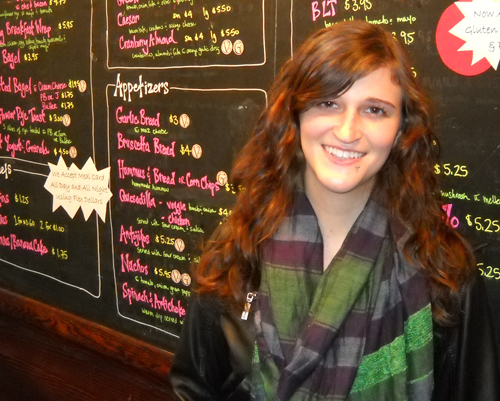
U of G undergrad students hope to help cook up a first-ever national food policy for Canada. Following “kitchen table talks” held on campus this month, student organizers plan to share their recommendations with a national group formed to encourage discussion of the country’s food system.
Along with selected faculty members and representatives of local agencies, Guelph students spent an evening in mid-October discussing food production, eating habits, youth obesity, local food, food economics, healthful eating and food policy.
They will compile and share their results with the People’s Food Policy Project (PFPP), a national network calling for a Canadian food policy.
This month’s event was run by about 40 bachelor of arts and sciences students as a requirement for their third-year community project course taught by English professor Anne Milne. She says the project will help students develop leadership smarts, assist community partners with social projects and offer suggestions for what she calls a sorely needed national food policy.
“Food has become such an issue on so many levels,” says Milne. “There’s lots of concern about food safety and security. It seems like a time when a lot of things are coming together.”
Says Amanda Sheedy, PFPP national co-ordinator: “We need a food policy because food is a complex issue. We’re now governing food as pieces of a puzzle that haven’t been put together yet. We need a comprehensive approach so that agricultural policy doesn’t work against food security goals of food for all, and vice versa.”
She says the national project aims to ensure access to healthful food and fair returns for providers, favour local consumption over exporting food, and enable people to help shape policies and programs.
Pointing to problems with Canada’s food system, she lists the following:
- Canada is the only G8 country without a school lunch program.
- Although our food exports have increased four-fold over the past two decades, almost 800,000 Canadians needed help from food banks in March 2009 alone ─ 18 per cent more than the previous year.
- Obesity is rising even as some people lack enough food.
“This is appalling for a country like Canada that considers itself one of the food baskets of the world,” says Sheedy.
The project launched “kitchen table talks” across Canada in mid-October, including an event held by local groups in downtown Guelph.
Information and ideas from those events will be used by the network to write a national food policy later this fall to be shared with politicians, media and other groups.
During the U of G event, third-year student Tara Joly shared food stories with her group, whose participants spoke about having witnessed the loss of farmland and small farms across Canada.
Joly has watched development march across swaths of rural Oakville, Ont., where she grew up. “It’s eating up the farmland,” says Joly, who frequents the Guelph farmer’s market and has encouraged her family to buy local and to consider her vegetarian lifestyle.
Another market patron is her classmate Elizabeth Pearson, who says she was surprised to learn that not all vendors are local growers. “I was shocked by this, and I love going to the farmer’s market, so I made it a personal goal to do a little research before taking my business to a vendor at the farmer’s market.”
She hopes the kitchen table talks will raise awareness of food issues among Canadians.
Student Elise Millett says this project enables ordinary Canadians to voice concerns about the food system. “As oil prices continue to go up, food prices will follow,” she says. “Right now, the way that nearly all food is grown and manufactured depends on fossil fuels and harmful pesticides. We need to begin looking at ways of changing food processing and food consumption so that they are more sustainable and independent of fossil fuels and oil prices.”
As an English professor, Milne says she’s interested in “the power of stories to inspire and influence, to create new cultures and ideas around food, and to reflect what people are thinking about food.”
She took over the community project course this year. Looking to broaden local connections and emphasize this year’s course theme of sustainability, she worked with Rachel Farahbakhsh, co-ordinator of community engaged learning programs in Student Life, to find more local agencies.
Students in the course now work with the food bank run by the Central Student Association, the U of G Sustainability Office and the Guelph Centre for Urban Organic Farming. Others work with Give Yourself Credit, an off-campus program providing alternative high school education for at-risk youth, and with the Guelph Environmental Leadership program.
Farahbakhsh says the kitchen table talks are “an exciting way for students to become very engaged in a national process and apply their classes to the community.”